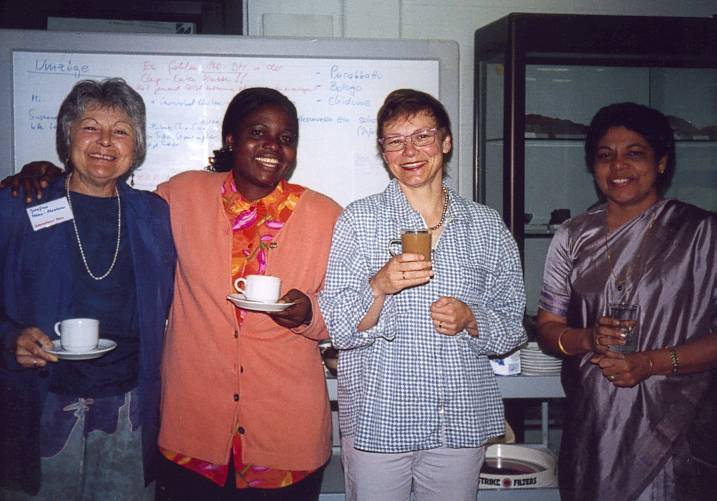
Josefina Mena-Abraham, Mary Kemi Idowu, Sabine Kunst and Leelamma Devasia
Deans |
Local Dean: Prof. Dr. -Ing. habil. Dr. phil. Sabine KunstProf. Dr.-Ing. Dr. phil. habil. Sabine Kunst was born in December 30th, 1954 in Germany, lives in Hannover. She is University professor since 1991 and works at the Department of Waterquality and Wastemanagement at the University of Hannover; specialized in wastewater management, waterbiology and biological processes of wastewater treatment. In the whole time she was entrusted with international projects in co-operation with Brazil, Argentina, Costa Rica, Mexico, Ecuador and the European Union. Since 1994 she conducted research projects on water and gender. Mrs. Sabine Kunst has been active at the International Women's University as a national dean for the project area water since July 1999. Her study at the University of Hannover from 1972 to 1982 covers the environmental science like biology with later engineering specialization as well as the philosophy science sector. During her study she had an extensive experience abroad : South America, India, China and South-Africa. In 1982 she received a doctor degree (Dr. -Ing.) in civil engineering on the thesis : "biogas installations / anaerobic wastewater treatment". In 1990 she promoted additionally as Dr. phil. on the thesis : "interdisciplinarism and particularism". 1990 she continued her study in co-operation with the University of Cape Town (UCT); receiving her Habilitation for a thesis entitled: " biological phosphorus elimination and management of water resources". Sabine Kunst began her professional career as scientific assistant at the Department of Water and Wastewater-Management at the University of Hannover already in the study period from 1982 to 1984. Within, in the period 1984-1990, she transferred to the Federal Office for Environmental Protection in Berlin, (UBA - "Umweltbundesamt") working on the topics: waste; further education and organization of research projects. She contributed from 1984 up to now to projects abroad where she had special responsibility for e.g. the planning of wastewater lagoons, rehabilitation of surface water in Bolivia and Peru, Costa Rica and Brazil.
|

|
International Dean: Arq. M. Sc. Pdta Josefina Mena-AbrahamThe Maya-region of Yucatan is her country of origin. Mrs. Mena-Abraham lives today in Mexico City where she is president of the Mexican NGO: "Grupo de Tecnologia Alternativa" GTA which she founded in the late 70's. She graduated as an Architect in 1965 in the Instituto Tecnológico y de Estudios Superiores de Monterrey where she obtained the highest condecoration of her generation, i.e. Premio al Saber. She has done postgraduate studies in Paris, France / Université de la Sorbonne; as architect she was interested in the city' sociology. At this time the philosopher Claude Lewi Straus was giving lectures on this theme in La Sorbonne. Later she studied in London "regional planning" where she obtained a Master of Science degree in University College London in 1972. It is here where she became part of the alternative technology movement and started working on this discipline till now. The Mexican scientist Josefina Mena-Abraham is one of the main initiators of the project area "Water": During more than 20 years, GTA has been developing alternative technology for urban and rural situations in order to prevent water-based illnesses due to bad sanitation conditions. She has given a modern form to indigenous Mexican ethnobiological principles in order to eliminate pathogens contained in human waste employing indigenous bacteria which characterize all the different models of alternative sanitation technology which today GTA manufactures and installs in most of the States of Mexico. The Mexican government has given her the title of Inventor of the system called SIRDO: which means Integral System for recycling organic waste. Her work met with a highly positive response when presented at the UN conference in Peking, China in 1993, as the developing countries' contribution to the Agenda 21. She has working experience in France, England, Portugal and Guinea-Bissau, mainly building housing with Alternative technology. As she came back to Mexico in 1977, she had to engage herself in the planning commission of the government. It was for Mrs. Mena-Abraham a revelation; she realized that the wrong water management is increasing as the social problem of Mexico. Up to now the professional aim of Mrs. Mena-Abraham was to stimulate planning, ecological and social action in the country of Mexico. Thus the NGO launched by Josefina Mena-Abraham combines a mature technological concept with a broadly based educational approach that takes into account the population's cultural background and economic situation. GTA has developed a methodology called "Planning for recycling" and produces hundred of sanitation units, employing recyclable materials, whose cost is accessible to rural and urban population, achieving important impacts on public health and introducing new micro-economics schemes for improvising agricultural production based on recycling organic waste. In March 2000 she has received the International Design Award in Washington by the National Wildlife Federation. The International Women's University has succeeded in securing the services of this internationally renowned scientist as international dean for the project area water.
|